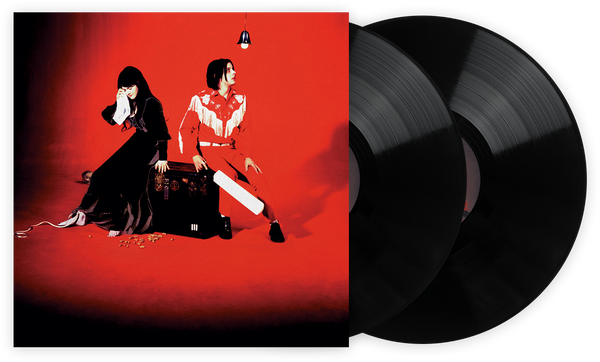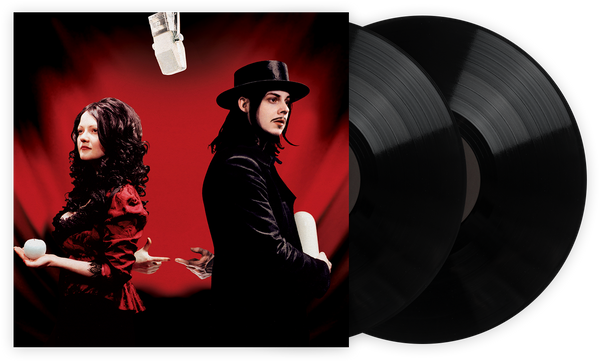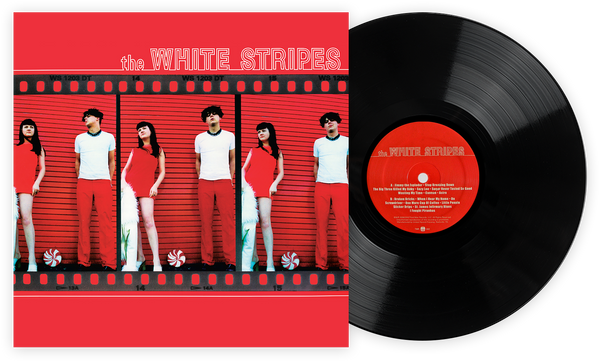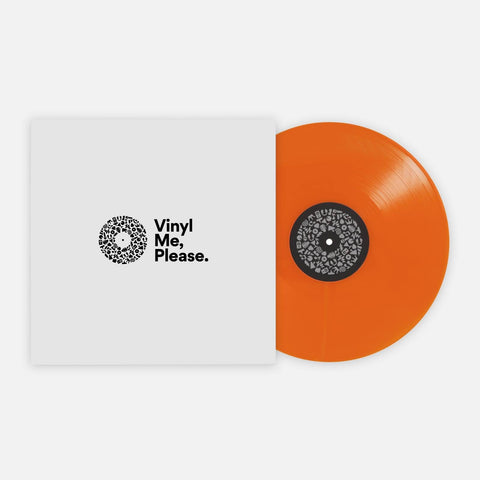This month marks 10 years since the release of Icky Thump, the final album released by The White Stripes. Icky Thump’s diverse, sometimes confounding collection of tunes marked the end of Jack and Meg White’s partnership—a duo whose presence in the world of rock throughout the 2000s was singular and enthralling.
While Meg has been (characteristically) quiet since the break-up, Jack has remained exceedingly prolific and consistently fascinating to watch. Whether under the umbrella of The Raconteurs, The Dead Weather, or solo, White continues to mine his treasure chest of influences (early blues; honkytonk; Dylan-esque folk; radio-ready classic rock; Scottish freak-folk) in new and exciting ways. With a new solo album in the works, White shows no signs of slowing down. These 10 albums are his best so far.

The White Stripes: The White Stripes (1999)
The White Stripes’ self-titled debut album is a junkyard dog of a record—loud, raw, brutally effective. It smells like cigarettes and bad decisions. Bristling with talent and vision, Jack White arrived with the confidence of an artist many years his senior. The opening rumblings of “Jimmy the Exploder” are a clear distillation of what follows. “Jimmy” alternates between the swaggering drive of its verses and its frenetic yelp of a chorus before lumbering into a cover of Robert Johnson’s “Stop Breaking Down.” The songs here don’t so much transition as lurch abruptly, veering from one frenzied high to the next with few respites (the breaks that do arrive, however, like “Do,” gleam with atmosphere). The whole album maintains this seamless cohesion, crafting a powerful cocktail of grimy blues and twitchy garage rock that is both unique within the Stripes’ discography and telling of what was to come.

The White Stripes: De Stijl (2000)
De Stijl, the second White Stripes album, stands alone in its own corner of their discography, a transitional album that doesn’t fit neatly into the obvious extremes of their oeuvre. The energy of the debut remained firmly intact, but its scrappiness had been channeled to more adeptly utilize White’s pop instincts. The product is sneakily charming, a diverse and likeable middle ground between the rough edges of The White Stripes and their increasingly polished later work. While the whiskey-soaked blues of “Little Bird” and “Death Letter” would have been right at home on their self-titled record, the easily digestible, almost sunny melody of “You’re Pretty Good Looking (For a Girl)” (not to mention the addictive “Hello Operator”) hints at an accessibility absent from previous Stripes output. The Stripes feel comfortable—content, even—to move from the snail’s pace of “A Boy’s Best Friend” to the whiplash-inducing bludgeoning of “Let’s Build a Home.” It’s fair to characterize De Stijl as a warm-up for better music still to come, but it has a unique, compelling identity of its own.

The White Stripes: White Blood Cells (2001)
The fact that White Blood Cells, the White Stripes’ eye-popping breakthrough album, was recorded in three days feels like both a stunning testament to the brilliance of the Stripes and a searing indictment of my own productivity (I took three days to finalize this sentence). Jack and Meg were firing on all cylinders with White Blood Cells, delivering an album better in just about every respect than the two that preceded it. You can almost hear the parts clicking into place; The White Stripes and their identity as a band finally feel fully formed. “Fell In Love With a Girl”, with its Michel Gondry-directed LEGO music video, was a bonafide hit. “We’re Going To Be Friends” offers a quaint, childlike acoustic ballad just moments before the venomous snarl of “I Think I Smell a Rat”; “Aluminum” is an all-caps Sabbath-esque screech of an instrumental, while “This Protector” closes the album with nothing but piano. If there were any remaining doubts about the skill and versatility of The White Stripes, Jack and Meg spend most of the duration of White Blood Cells shredding them to bits.

The White Stripes: Elephant (2003)
There are all sorts of big moments on Elephant, the brilliant fourth album from the White Stripes. The most obvious comes first—“Seven Nation Army,” the record’s opener, is a massive, unlikely soccer anthem. But the scale feels different elsewhere, too. The song structures are looser, the climaxes more intense, the scope more ambitious. The broader sonic palette wielded on White Blood Cells is enriched and expanded. “There’s No Home For You Here” delivers its unwelcoming message via what could only be an entire hallway filled with Jack Whites. “Black Math” casually melts into a slower tempo just as it seems to have perfected its groove. “The Hardest Button To Button,” accompanied by one of the Stripes’ most iconic videos, is an instant classic—anxious, pulsing, irresistible. The album’s centerpiece, “Ball and Biscuit,” is all sex god posturing and show-stopping guitar solos. It’s the longest White Stripes song and it’s also probably the best.
Elephant also appears keen to shine a light on White’s contradictions in intriguing ways, intentionally fanning the flames of his enigmatic persona. Is he forceful and dominant (see “Black Math”), or is he the timid suitor of “I Want To Be the Boy To Warm Your Mother’s Heart?” Does he “get nervous when she comes around,” or is he the unflappable sexed-up playboy of “Biscuit?” It hardly matters; on Elephant, he’s a bonafide rock god.

Loretta Lynn: Van Lear Rose (2004)
Late-career comebacks can be immensely difficult to engineer—particularly when you’ve been a force in the music world for the better part of four decades. With Van Lear Rose, though, White ably played the Quentin Tarantino to Loretta Lynn’s John Travolta, revitalizing a career that had long flirted with stagnation. White, who produced the album, strikes a skillful balance; his fingerprints are all over the record, but he avoids stealing the spotlight from Lynn, whose songwriting here eclipsed anything she had done in years. Surprisingly, White and Lynn’s pairing isn’t a dramatic departure from Lynn’s well-worn sound—her storytelling is as rich, compelling and witty as ever, and the album’s sonic textures, while vibrant and modernized, stay true to her roots. White shows up to duet on the excellent “Portland, Oregon,” but mostly (wisely) stays out of Lynn’s way. Her writing and delivery here are alternatively fun (“Story of My Life”) and genuinely moving (the title song and “Miss Being Mrs.”).

The Raconteurs: Broken Boy Soldiers (2006)
The formation of The Raconteurs (a supergroup consisting of White, Brendan Benson, and Jack Lawrence and Patrick Keeler of the Greenhornes) offered White a new outlet and with it, a new range of musical possibilities as he settled into a co-headlining role opposite Benson. Fun as the change of scenery is, many of the modifications are just tweaks around the margins; the White of The Raconteurs isn’t radically different from his other incarnations. Like his best projects, Broken Boy Soldiers finds White sprinkling familiar confections (various hybrids of blues, punk, garage, classic rock) with his signature idiosyncrasies. And while there are some truly weird moments, Broken Boy Soldiers also contains some of the purest pop music of White’s career—likely as a direct result of Benson’s moderating influence. “Steady, As She Goes” boasts an undeniable earworm of a hook, and other songs on the record are similarly accessible (“Together” and “Call It a Day” come to mind). Other highlights include the vividly psychedelic “Intimate Secretary” and the standard but soulful blues closer “Blue Veins.”

The White Stripes: Icky Thump (2007)
While it wasn’t initially apparent that Icky Thump would be the final White Stripes album, it makes a lot of sense in retrospect. More restless and weirder than it got credit for upon its release, Thump represents the logical evolution of the quirkiest Stripes ideas extended to a frenzied bursting point. “Rag and Bone,” a straightforward blues instrumental spiked with a jokey concept, casts Jack and Meg as something of a comedy duo. “Conquest” reworks a conventional 1950s song into a bombastic orgy of mariachi horns. “Prickly Thorn, But Sweetly Worn” is bagpipe-driven yodel that crumbles into a spazzed-out spoken-word interlude.
White doesn’t get totally lost in these left turns, though, leaving plenty of room for some of his favorite obsessions—guitar freak-outs (“300 M.P.H. Torrential Outpour Blues”), stripped-down, tongue-in-cheek acoustics (“Effect & Cause”), and old-fashioned blues (“Catch Hell Blues”). Meg’s drumming is as uniformly great as it’s ever been, and Jack’s guitar work and vocals on songs like “Bone Broke” and “I’m Slowly Turning Into You” feel equally effortless. Bold and deliriously fun, Icky Thump wears its divergent influences with a grin, closing out The White Stripes era with character and panache.
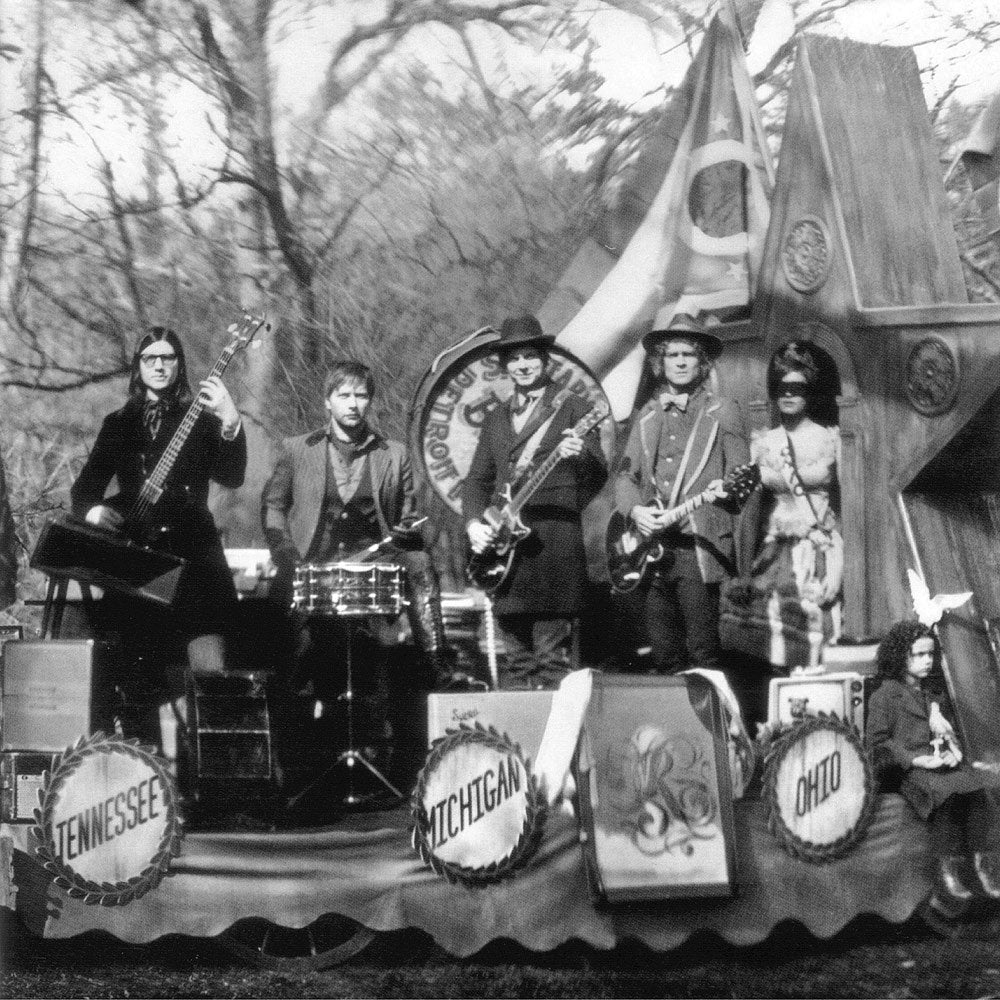
The Raconteurs: Consolers of the Lonely (2008)
White’s projects, big and small, have often been a tug-of-war between his weird, avant-garde side and his more commercially palatable tendencies. Consolers of the Lonely, then, delivers a decisive win for the latter. The second (and perhaps last?) album from The Raconteurs, Consolers plays like a genuine crowd-pleaser. Zeppelin-style guitar-driven blues rock (“Top Yourself”) is present as always, as are riff-based garage rock (“Salute Your Solution,” the record’s enormously fun first single), serene ballads (“You Don’t Understand Me”) and country flirtations (“Old Enough” and superb closer “Carolina Drama”). The band even tries its hand at Billy Joel-style pop (“Many Shades of Black”), which sounds like it should fall flat on its face (it does not). Consolers lacks the concision of its predecessor, but its deliberate kitchen sink approach (and improved chemistry between White and Benson) more than justifies its bulkier length.

The Dead Weather: Horehound (2009)
Despite White’s status as one of rock’s most magnetic frontmen, many of The Dead Weather’s finest moments belong to Alison Mosshart of The Kills. White’s presence always lingers, but much of the band’s work—including and perhaps especially Horehound, the band’s 2009 debut—is largely Mosshart’s show. Occasionally White—who drums ferociously throughout all three Dead Weather albums—seizes the spotlight (see the bizarre, shrieking “I Cut Like a Buffalo”), but Horehound embraces the collaborative dynamic that anchored The Raconteurs’ records. It’s a better album for White’s contributions, but it’s also better for refusing to lean on his starpower. Horehound is often intentionally ugly; its production sometimes squeals and hisses noisily. The result is perhaps the most atmospheric release in White’s discography. Extra points for the aching slow burn blues of “Will There Be Enough Water?” the album’s haunting closer.

Jack White: Blunderbuss (2012)
More than any other White record, Blunderbuss is intent on exorcising demons. White’s first solo effort, Blunderbuss was recorded in the aftermath of The White Stripes break-up and in the midst of a reportedly messy divorce. The result is a more direct and acidic lyrical style than White typically embraces. Opener “Missing Pieces” muses darkly about a significant other “walk[ing] away and tak[ing] a part of you with them.” “Love Interruption” goes a step further: “I want love to roll me over slowly, stick a knife inside me and twist it all around.”
White’s reckoning with his personal life feels uncomfortable and complicated. But it doesn’t hinder a uniformly strong set of songs. “Sixteen Saltines” could have comfortably resided on a theoretical seventh White Stripes record. “Blunderbuss” is a quintessential White pop song, dipped in the mildest of alt-country twangs. For those missing the piano White largely abandoned since Get Behind Me Satan, it makes a return here—most notably on the melodramatic but striking “Weep Themselves To Sleep.” Blunderbuss wiggles out from underneath expectations, painting in familiar strokes but embracing Jack’s newfound freedom as a solo artist. The album is generally softer-edged but more musically eclectic than most previous efforts. Imperfect though it is, it’s filled with ambition and invention, the work of an artist who doesn’t need to prove himself but is itching to anyway.
Alex Swhear is a full-time music nerd from Indianapolis. He has strong opinions about music, film, politics, and the importance of wearing Band-Aids to Nelly concerts.
Join the Club!
Join Now, Starting at $36Pages

